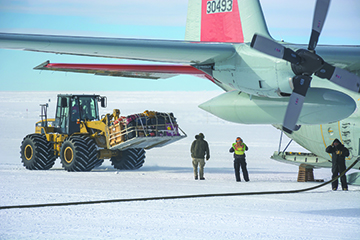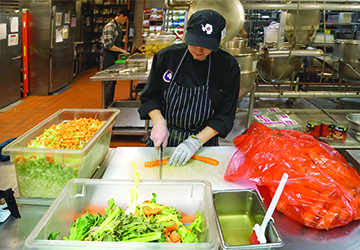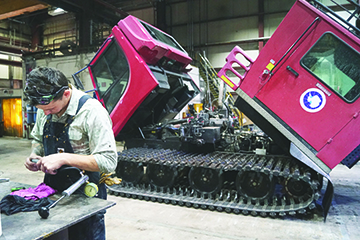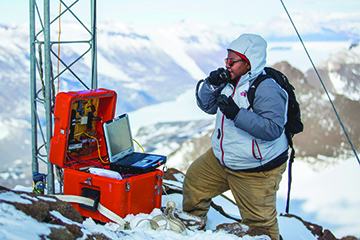“Antarctica has this mythic weight. It resides in the unconscious of so many people, and it makes this huge impact, just like outer space. It’s like going to the moon.” Jon Krakauer
Currently, there is a palpable mood of distaste among Denver’s working-class citizens. Jaw-dropping rent rates, lack of jobs offering a sustainable wage, mounting inflation and rising crime have a lot of people looking for a way out.
If these circumstances resonate, perhaps you have fantasized while stuck in bumper-to-bumper traffic and wondered to yourself, “What if there was somewhere I could go where I could work at my chosen profession and be properly compensated while not having to commute, pay rent or spend money on food or clothing?” If you think this sounds too good to be true, think again. The portal to this magical land of vocational and existential idealism is located right in your own backyard. It’s the Leidos Antarctic Support Contract (ASC) office — just south of Denver in Centennial, Colorado.
Step Right Up

A loader brings a pallet of luggage to a recently-landed LC-130 that’s also preparing to depart from the Amundsen-Scott South Pole Station. Planes can only stay on the ground for a short period of time at the pole, on account of the extreme cold.
The communications agent at the ASC, Elaine Hood, explains, “Interested people should visit www.Leidos.com/Antarctica to learn about the Antarctic Support Contract. That page lists the various companies that hire for different jobs in Antarctica.” Website visitors will find an amalgam of overlapping agencies with similar jurisdictions and functions. The Centennial recruiting headquarters is, in fact, an umbrella organization involving an extensive network of subcontractors. These include GHG Corporation, Gana-A’Yoo Services Corporation (GSC), PAE (Pacific Architects and Engineers) and University of Texas Medical Branch (UTMB). Each agency maintains a presence in the Centennial Leidos office while using a variety of extraneous recruiting resources such as SEO-enhanced websites and independent HR campaigns. Many recruiting sites are domains named after popular search terms such as www.cool antarctica.com and www.wandereatwrite .com.
Vocational Abundance
Currently, there are listings for dozens of available IT positions including network engineers, computer technicians, broadcast engineers and web applications developers as well as a few hands-on positions such as antennae rigger and mammal observer. The medical contingency is also hiring for positions such as physicians, mid-level practitioners, dentists, nurse administrators and physical therapists — to name a few. The trades are also hiring with listings for shop foreman, fleet operations foreman, plumber foreman, preventative maintenance foreman, cook, electrician, carpenter, firefighter, boat handler, diving officer, radio operator and many more.
Elaine Hood places emphasis on the fact that Antarctica, for obvious reasons, is in fact experiencing a labor shortage. “The more skilled trades positions are difficult to fill simply because they require certifications and years of experience doing specific jobs such as being a refrigeration mechanic. Yes, we need freezers in Antarctica to preserve frozen food as well as science samples! Positions can also be difficult to fill because people must leave behind their family and friends for six months, over holidays, birthdays, anniversaries, and other milestones that occur between October and March.”
The Upside Down

Food being prepared at McMurdo Station, Antarctica, for the Thanksgiving holiday meal. Fresh vegetables, known as “freshies,” are greatly desired where they are scarce. Photo credit: Mike Lucibella, NSF
Currently, a hiring campaign is underway for the upcoming summer season. In Antarctica, this season goes from October through February while winter goes from February until October. The summer is the easier of the two, featuring average daily temperatures of around zero degrees Fahrenheit while a “winter over” as it is locally known, can feature a consistent deep freeze chill of 30 to 40 degrees below zero. “Everything is more difficult in Antarctica,” Hood explains, “and takes longer than it would off the continent. That can be frustrating. While we try to have spare parts in warehouses, occasionally something may break on, say, a snowplow that will require that part to be flown in. That one part can take weeks to reach Antarctica.”
Hood continues, “Some positions receive few applications and are difficult to fill, while others receive thousands of applications and are easy to fill. For example, finding experienced tradespeople — diesel mechanics, plumbers, electricians — can be difficult. We need people who can troubleshoot and resolve problems based on years of experience. People with that level of expertise may not be in a personal situation where they are willing to be away from family for six months over the holidays (Sept.-March), so we don’t receive as many applications for those positions as we would like. On the other hand, working as a steward in the cafeteria is a position that hundreds of people may apply for.”

Light Vehicle Technician Matt Means works on a PistenBully inside McMurdo Station’s Vehicle Maintenance Facility. Mechanics are a critical position in support of scientific research in Antarctica. Photo credit: Elain Hood, NSF
Unexpected Discoveries
If you land a job, you might end up staying longer than you planned. “In general, we have about 60% return [of seasonal workers],” Hood begins. “We have many people who will take an entry level position just for the opportunity to be paid to work in Antarctica. Let’s say they are a high school teacher who thinks she is taking a one-year break from teaching. She may work as a steward in McMurdo Station, replenishing food on the cafeteria buffet line, but as the season progresses, she realizes she has met the most extraordinary people and applies to return for a second season in the Supply department. The research stations have supply warehouses where everything from plumbing, food, electrical and other inventory are kept — remember there are no supermarkets and Home Depots in Antarctica. So, she applies for and returns for her second season in the Supply department and the next thing you know she has been deploying for a dozen years when her original plan was to only go one time. We have people who have been doing this for 10-20 years.”
An Adventure Awaits

McMurdo Station Communications Supervisor Teri Cotton tests a radio installation from atop a mountain in the Transantarctic Mountains. Antenna riggers and radio repair and maintenance are two of hundreds of jobs required to support the U.S. Antarctic Program. Radio repeaters are installed to facilitate communication in the region of McMurdo Station. Photo credit: Johnny Chiang, NSF
Should you get hired as a U.S. citizen, your likely landing place will be McMurdo Station — the logistics headquarters of the United States Antarctic Program and the largest of three research stations run by the National Science Foundation. The other two are Amundsen-Scott South Pole Station and Palmer Station. At McMurdo, which is more like a small town than a research station, you will live and work among 1,000 or so other residents for the duration of your contract.
Elaine Hood breaks down what to expect, “Once a contract is offered, the candidate must complete a medical and dental examination to be deemed physically qualified (PQ’d). Each of the three USAP stations has a medical clinic and a doctor, but there is no dentist. The medical clinics are not equipped to handle long-term care for major health crises such as strokes or heart attacks. The objective of the PQ is to screen out applicants whose health may be at risk of a major incident.
Once you have been PQ’d, you get advice on what to pack for your particular job, such as work boots and long underwear. You will be flown to either Christchurch, NZ, or Punta Arenas, Chile, where you will receive cold-weather clothing — heavy parka, gloves, wind pants — that will be returned to inventory upon your departure from Antarctica. During this time, you will attend training and orientations so that when you arrive in Antarctica you are ready to begin working.”
A Living Wage
If you’re thinking about taking the plunge, consider that with no extraneous spending temptations or basic living expenses, you might be able to save a fairly sizable chunk of change. Then, when you return to Denver, perhaps you can afford a down payment on an insanely overpriced house. Or you can sign another work contract and turn around and go back to Antarctica, hoping perhaps on your next return things in your beloved Mile High City have improved.

